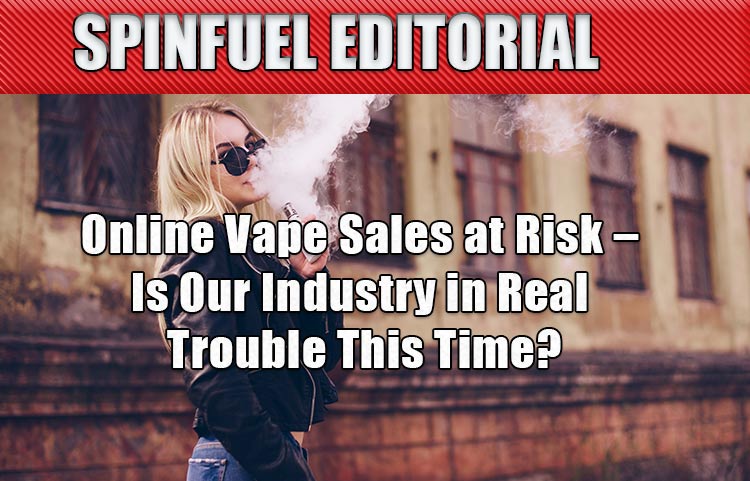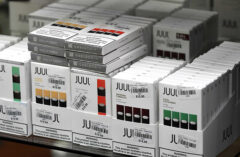Table of Contents
Last Updated on September 28, 2018 by Team Spinfuel
The future of online vape product sales is “on the table” according to reports from the US Food and Drug Administration (FDA). In itself, this doesn’t seem like much of a warning, considering how many times American vapers have heard about FDA regulations coming down the pike.
But this time, something’s different – something that might push legislators to follow through on the threats that have loomed over companies for years. And once again, it centers on youth access, online availability and the use of flavors.
(Because remember, once you turn 21 and make adult decisions, you no longer enjoy flavors other than tobacco.)
This renewed urgency comes from FDA Commissioner Scott Gottlieb, who claimed the FDA is laser-focused on vaping and e-cigarette use, saying the agency is “very clearly looking at it.” And this comes just a week after the Commissioner stated that youth adoption of vaping is an “epidemic” that needed to stop.
One of the reasons why this latest effort is likely to create more waves in the vaping industry is that it’s coming from a more realistic place. The FDA is acknowledging that vaping and e-cig use offer a less-harmful alternative for adult smokers. But they’re also putting out this concession while stating that these gains can’t come at the expense of young people developing nicotine addictions.
Look, we couldn’t agree more. And Spinfuel VAPE is adamant in its stance that vaping and vape products should neverbe made accessible to youth. We are alarmed by the CDC National Youth Tobacco Survey, which revealed that use of e-cigarettes (like the JUUL pod mod) has grown 75% year over year. And we hold all retailers to task for allowing them to get them.

So, What’s Next?
Because of this report, the FDA is now demanding that five of the leading mass market vaping brands – JUUL, Vuse, MarkTen, BLU and Logic – provide detailed plans within the next 60 days, explaining how the companies plan to combat teen access to their products.
Additionally, more than 1,300 online vape vendors and traditional vape retailers received FDA warning letters about selling to minors, with roughly 10% of them already in line to pay fines for not doing more to prevent youth access to nicotine vape products.
The looming threat here? Complete, 100% removal of flavored electronic cigarettes from shelves. Which not only hurts responsible adult vapers, but also stores that are responsible retailers and online vape vendors. And unlike past legislative motions, there’s no “grandfather” clause to benefit older, more established companies that already had products on shelves.
Nope – they’re gone, too.
The ONLY way any vape company would then be able to get products back on shelves was to demonstrate a clearly defined public health improvement – and how many vape companies have access to this information? And how many will, once the FDA finds what it’s looking for?
JUUL, and similar companies producing closed, contained “pod” systems are also under fire, likely due to the discreet, simple nature in which they’re operated, versus more complicated tank systems. And to their credit, they’ve responded appropriately, with expensive, elaborate print and online ad campaigns to make their stance clear on teen vaping.
We fully expect the other “major” companies cited by the FDA to follow suit, which can only be considered a positive for all involved. We don’t expect SMOK to buy full-page newspaper ads, but it can certainly contribute in other ways to ensure the company’s endless line of products (including its JUUL-like pod mod systems) don’t end up in the wrong hands.
In short, if alcohol brands can do this successfully, there’s no reason middle-schoolers should end up with pod mods in their pockets so easily. It comes down to common sense.
Our Unsolicited Thoughts…
Though this was intended as a news article, our team simply can’t help but wonder how much LESS criticism our industry would face, if every company just chose to follow rules… and more importantly, use some good, ethical sense in the marketing of products.
For starters, one of the major reasons flavors (such as candy and dessert types) are under such fire from the FDA isn’t because the government doesn’t believe adults enjoy them. It’s because of how frivolous and irresponsible companies are in advertising them.
In other words, if you have an e-liquid that replicates the flavor of a popular candy or pastry, companies shouldn’t have to violate copyright (and good sense) in order to promote them. Responsible adults will find it without a poorly copied logo and graphical treatment. We don’t feel bright colors and cartoon characters ever made the difference in an e-liquid sale, any more than Joe Camel did for cigarettes.
Are they bright and cheery? Sure. Do they immediately evoke thoughts and memories? Of course. But so do the descriptions in catalogs, and the testimonials of customers and vape shop owners. Ultimately, without this blatant disregard for both young people and intellectual property, we think flavored e-liquid isn’t nearly as big a target for the FDA.
Secondly, online vape vendors – a primary target of the government, thanks to the ease of falsifying information to prove age – need to implement MUCH stronger protection measures to prevent underage purchase. Perhaps requiring driver’s license information, followed by a “secret question” structure (similar to online banking sites) can ensure only the people who establish accounts can make purchases from them.
While the risk of underage purchase is still there, the same risk is there for any number of other online transactions. But requiring accounts to be verified, and continuing to demand proof throughout the shopping process will help stave off kids who think they can just grab dad’s credit card to order vape products.
It might be more annoying for adults to shop this way, but you know what’s worse? Not having the option to buy via online vape vendors at all – which is a definite possibility should companies continue to make their products accessible to underage buyers.
Everyone at Spinfuel VAPE agrees that a fairly regulated, more responsible vape trade in America is a positive. This industry can no longer grow without protections, quality standards and strict controls in place to fight off misuse of these products.
In other words, it’s not the “wild west” vaping frontier from eight years ago. This is a multi-billion dollar online vape industry that has the potential to save countless more lives – and it will continue to do so, if companies mature at the same rate as the market.
The FDA might seem like the proverbial “bad guy” for now – and they will certainly have to maintain fairness throughout this journey. But they’re also not going away. The better our industry responds and adapts to looming regulations, the better we’ll all be in the long run.








